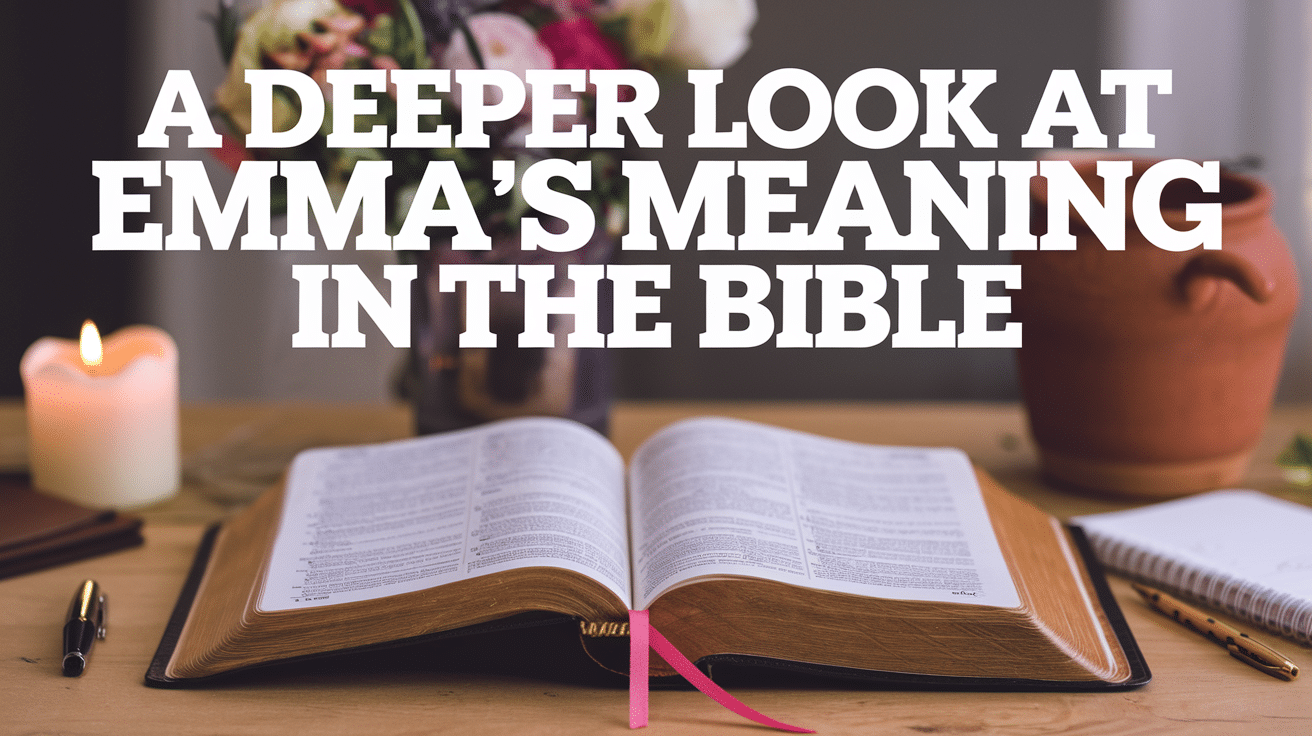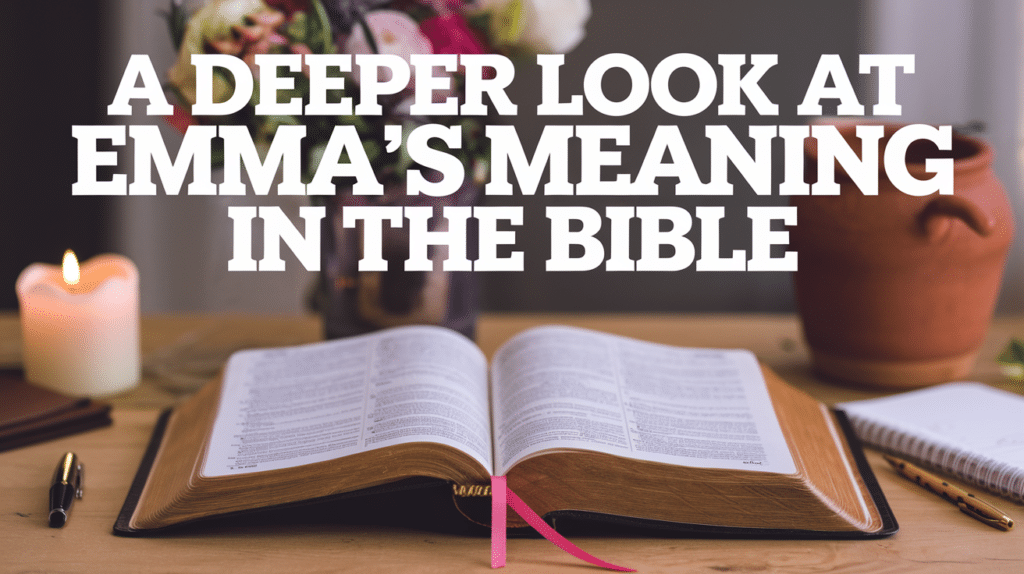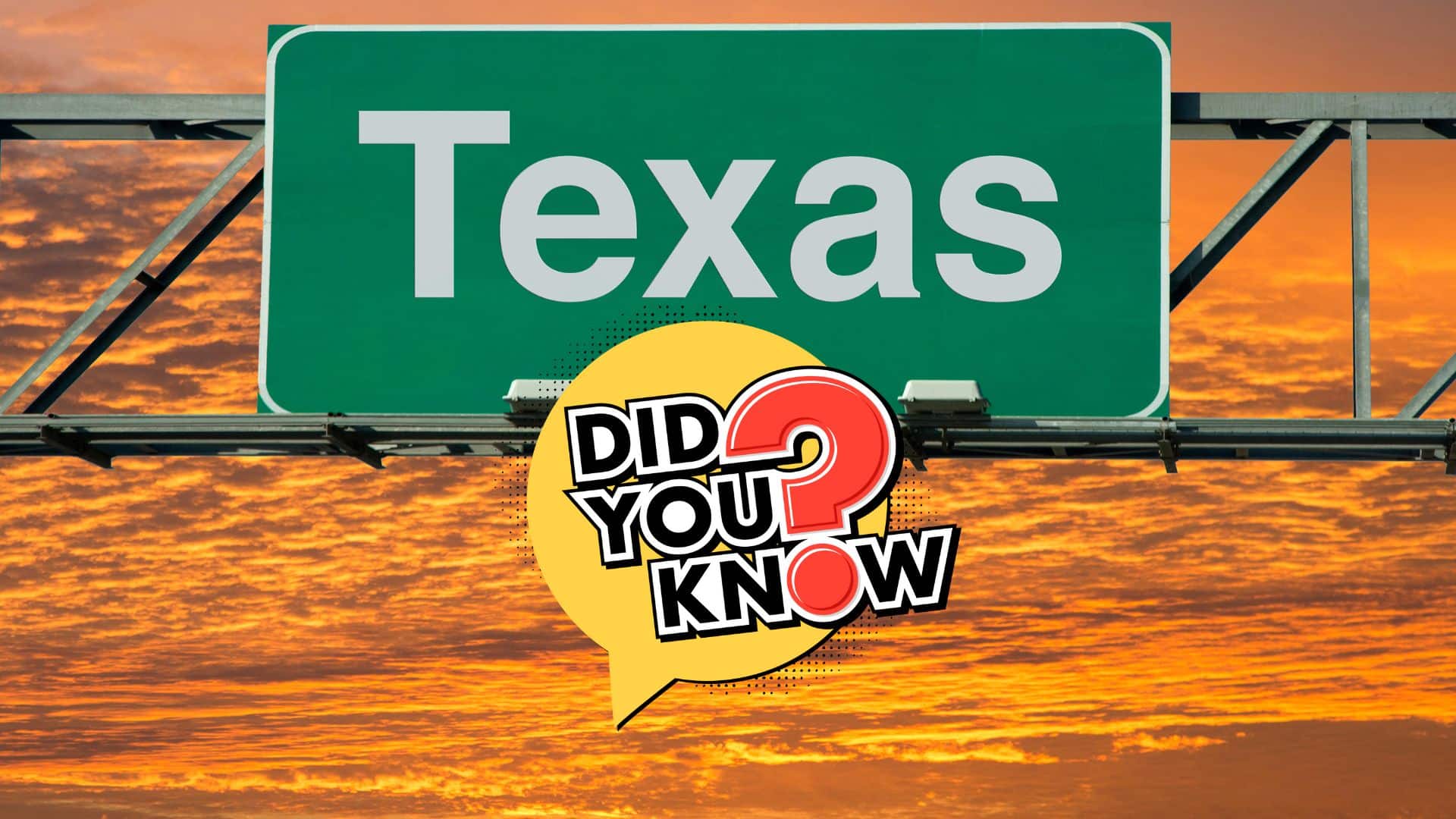

A Deeper Look at Emma's Meaning in The Bible
A Deeper Look at Emma’s Meaning in The Bible
A Deeper Look at Emma’s Meaning in The Bible
 Anthony Robinson
Anthony Robinson
February 25, 2025 Names carry deeper meanings than what meets the eye.
Names carry deeper meanings than what meets the eye.
The name Emma, despite its absence from biblical texts. Did you know there’s more to it when viewed through a biblical lens?
Learn surprising connections between Emma’s meaning and core Christian values.
This blog entails how this beloved name, ranking consistently in the top 10 baby names worldwide, intertwines with biblical themes of completeness and divine grace.
Stick around to unpack these hidden spiritual gems behind one of today’s most popular names.
A Look at Emma’s Meaning In The Bible
Category
Description
Origin
Germanic in origin, derived from the ancient word “ermen” or “irmin” meaning “whole” or “universal.” It gained prominence through various European noble families.
Popularity
Consistently ranks among the top 10 girls’ names in English-speaking countries since the 1990s, experiencing a significant surge after the release of Jane Austen’s novel “Emma” in 1815.
Tradition
Traditionally used as both a standalone name and as a diminutive of Germanic names containing the element “erm.” It has been borne by various queens and noble women throughout European history.
Culture
The name has strong cultural ties to literature and royalty, appearing in classic works and carried by notable figures like Emma of Normandy, Queen of England, and Emma Hamilton, Lord Nelson’s mistress.
Is Emma Mentioned in the Bible?
 No, the name Emma is not mentioned in the Bible. The name emerged from Germanic origins rather than biblical or Hebrew roots.
No, the name Emma is not mentioned in the Bible. The name emerged from Germanic origins rather than biblical or Hebrew roots.
While many popular female names like Mary, Elizabeth, and Sarah have biblical connections, Emma gained its prominence through European nobility and literature.
The name’s widespread use began in the medieval period, well after biblical times, particularly among Germanic and English-speaking populations.
Biblical Themes Associated with the Name Emma
While Emma is not directly biblical, its Germanic meaning of “whole” or “universal” can be connected to biblical themes of completeness and unity in Christ.
The concept of wholeness resonates with biblical teachings about spiritual completeness, as seen in verses like Colossians 2:10 (“You are complete in Him”) and James 1:4 (becoming “complete and lacking nothing”).
These connections make Emma spiritually meaningful for many Christian families.
A Modern Interpretation of Emma’s Biblical Significance
In modern Christian contexts, Emma’s meaning of “whole” or “universal” is often interpreted as representing God’s complete love and universal grace.
Contemporary believers may connect the name to biblical concepts of spiritual wholeness and unity within the church community.
Some Christian families choose Emma not for direct biblical ties, but for its resonance with themes of divine completeness and the universal nature of God’s love for humanity, as expressed in scriptures like John 3:16.
Emma In Different Languages
Language
Variations
Pronunciation
Spellings
English
Emma
EM-mah
Most common international spelling
German
Emma
EH-mah
Same spelling, slightly different pronunciation
French
Emma/Emma
EH-mah
Sometimes written with an accent: Emmà
Spanish
Ema
EH-mah
Often spelled with one ‘m’
Italian
Emma
EHM-mah
Similar to original Germanic spelling
Hungarian
Emma
EM-moh
Preserves traditional spelling
Polish
Emma
EM-mah
Sometimes written as Emka (diminutive)
Russian
Эмма
EM-mah
Cyrillic spelling
Greek
Έμμα
E-mah
Written in Greek alphabet
Japanese
エマ
E-ma
Katakana spelling
Korean
엠마
Em-ma
Hangul spelling
Chinese
艾玛
Ai-ma
Mandarin transliteration
Hebrew
אמה
E-ma
Hebrew spelling
Arabic
إيما
Ee-ma
Arabic spelling
Similar Names Like Emma
1. Emilia
Meaning: “Rival” or “Industrious”
Origin: Latin, derived from the Roman family name Aemilius
2. Emily
Meaning: “Striving” or “Excellence”
Origin: Latin, another variant of Aemilius/Amelia
3. Emmeline
Meaning: “Peaceful home” or “Work”
Origin: Germanic-French combination, derived from “amal” (work) and “lina” (tender)
4. Amelia
Meaning: “Work” or “Industrious”
Origin: Germanic, from “amal” meaning work or labor
5. Emery
Meaning: “Brave” or “Powerful”
Origin: Germanic, from “Emmerich” meaning home ruler
6. Emmett
Meaning: “Universal” or “Truth”
Origin: Hebrew and Germanic combination, masculine form related to Emma
7. Emerson
Meaning: “Son of Emery” or “Brave and powerful”
Origin: Old English and Germanic
8. Emmy
Meaning: “Universal” or “Whole”
Origin: Germanic, diminutive of Emma or Emily
9. Amelie
Meaning: “Hardworking” or “Industrious”
Origin: French variation of Amelia
10. Emmanuelle
Meaning: “God is with us”
Origin: Hebrew, feminine form of Emmanuel
Popular Songs, Characters and People Associated With Emma
Category
Name/Title
Description/Artist
Year/Notable Work
Famous People
Emma Watson
British actress
Known for “Harry Potter” series (2001-2011)
Emma Stone
American actress
Oscar winner for “La La Land” (2016)
Emma Roberts
American actress
Known for “American Horror Story” series
Emma Thompson
British actress
Two-time Oscar winner, “Sense and Sensibility”
Emma Bunton
British singer
Member of Spice Girls (“Baby Spice”)
Emma Corrin
British actor
Portrayed Princess Diana in “The Crown”
Songs
“Emma”
Hot Chocolate
Released in 1974, reached UK Top 3
“Emma”
The Sisters of Mercy
Released in 1983
“Emma”
Kelly Clarkson
From album “Thankful” (2003)
“Emma’s Song”
Laura Marling
From album “I Speak Because I Can” (2010)
“Emma”
Imagine Dragons
Unreleased fan favorite from early shows
“Sweet Emma”
The Grateful Dead
Live performance staple
Fictional Characters
Emma Woodhouse
Main character
Jane Austen’s “Emma” (1815)
Emma Frost
Superhero/villain
Marvel Comics’ X-Men series
Emma Swan
Main character
TV series “Once Upon a Time”
Emma Nelson
Main character
“Degrassi: The Next Generation”
What Zodiac Sign Aligns With Emma?
The name Emma is often associated with the zodiac sign Leo (July 23 – August 22).
People named Emma are thought to share Leo’s characteristics of natural leadership, creativity, and warm-heartedness.
Like the confident Leo, Emmas are believed to possess a magnetic personality and strong sense of self. They’re often seen as natural performers with an innate ability to light up any room, much like Leo’s ruling planet, the Sun.
Scriptures that Resonate With The Meaning of Emma
Colossians 2:10
“And you are complete in Him, who is the head of all principality and power.”
This reflects Emma’s meaning of “whole” or “completeness”
James 1:4
“Let perseverance finish its work so that you may be mature and complete, not lacking anything.”
Connects to Emma’s theme of being “whole” or “complete”
John 3:16
“For God so loved the world, that he gave his only Son…”
Represents the “universal” aspect of Emma’s meaning through God’s all-encompassing love
Ephesians 1:23
“Which is His body, the fullness of Him who fills all in all.”
Speaks to being complete and whole in Christ
Romans 12:5
“So we, being many, are one body in Christ, and individually members of one another.”
Reflects the universal, unified nature that Emma’s meaning suggests
Ephesians 4:13
“Until we all reach unity in the faith and in the knowledge of the Son of God and become mature, attaining to the whole measure of the fullness of Christ.”
Emphasizes wholeness and completeness in faith
Conclusion
While not directly mentioned in Scripture, Emma’s meaning of “whole” or “universal” beautifully aligns with fundamental Christian concepts of completeness in Christ and the universal nature of God’s love.
This connection has evolved from medieval European nobility to modern Christian families who find deeper spiritual significance in the name.
Emma continues to represent themes of wholeness and universality that echo throughout biblical teaching, making it a meaningful choice for families of faith.
FAQ’s
What Is the Spiritual Meaning of The Name Emma?
Spiritually, Emma represents wholeness and divine completeness. The name suggests universal love and being complete in faith, reflecting God’s all-encompassing grace.
Is Emma a Catholic Saint Name?
Yes, Saint Emma of Gurk (also known as Hemma) is recognized as a Catholic saint. She was an 11th-century Austrian noblewoman known for founding monasteries and helping the poor.
What Did Emma Do in The Bible?
Emma is not mentioned in the Bible. The name has Germanic origins and gained popularity in medieval Europe, not biblical times.
What Is the Lucky Number of Emma?
In numerology, Emma corresponds to the number 5, representing freedom, adventure, and versatility. This number is considered lucky for people named Emma.
X







